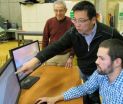(Press-News.org) CHAMPAIGN, lll. — Researchers have discovered a new compound that restores the health of mice infected with methicillin-resistant Staphylococcus aureus (MRSA), an otherwise dangerous bacterial infection. The new compound targets an enzyme not found in human cells but which is essential to bacterial survival.
The research team, led by scientists at the University of Illinois and the University of California, San Diego, reports the new findings in the Proceedings of the National Academy of Sciences. The team discovered and developed several compounds that are promising leads for antibacterial drug development, and the most potent was tested in mice infected with MRSA.
The rise of antibiotic-resistant bacterial infections is a global public health problem, said U. of I. chemistry professor Eric Oldfield, who led the research with UC San Diego professor Andrew McCammon.
"There's an urgent need for more antibiotics because of drug resistance," Oldfield said. "There are, for example, completely drug-resistant strains of tuberculosis. None of the drugs work against these strains of tuberculosis and so, if you get it, you die."
Other infections, such as gonorrhea, which once were easily cured with antibiotics, also are becoming resistant to treatment, Oldfield said. "And Staph itself actually kills more people in the U.S. than does HIV/AIDS."
To begin the study, McCammon and his colleagues at UC San Diego used computer simulations to look for potential chinks in the armor of a bacterial enzyme known as FPPS that aids in bacterial cell wall formation. The researchers then screened libraries of small molecules to identify some that might target those sites and interrupt the activity of FPPS. Oldfield's team tested some of these molecules against FPPS, but found that they were not particularly potent inhibitors of the enzyme.
"Then we tested the most promising compound against the next enzyme in the pathway, and we found that it was 20 times more active against that enzyme," Oldfield said.
That enzyme, called UPPS, "is important because it's involved in bacterial cell wall biosynthesis," he said. "And a lot of the antibiotics that we have – drugs like penicillin, methicillin, vancomycin – all target bacterial cell wall biosynthesis."
Graduate student Wei Zhu and research scientist Yonghui Zhang worked with Oldfield to develop and test new analogs of the compound that worked against UPPS.
"And we found one that was about 1,000 times more active than the first hit we had against FPPS," Oldfield said.
Illinois chemistry and Institute for Genomic Biology professor Douglas Mitchell tested the new compound against regular and drug-resistant S. aureus in cell culture and found that it had potent activity against both.
"He also found that it augmented the effects of methicillin" in methicillin-resistant Staph strains, Oldfield said.
In a final test, Dr. Victor Nizet at UC San Diego used the new compound to treat mice infected with MRSA.
"Twenty out of 20 animals survived if they were treated with this drug lead and zero survived if they weren't treated," Oldfield said.
More years of study will be needed to determine whether this compound or others like it will be effective in humans, Oldfield said, but the findings may allow scientists to target multiple enzymes essential to bacterial survival, thus reducing the likelihood that new forms of drug resistance will emerge.
INFORMATION:
The National Institutes of Health, National Science Foundation and Howard Hughes Medical Institute supported this research.
Editor's note: To contact Eric Oldfield, call 217-333-3374; email eoldfiel@illinois.edu. The paper, "Antibacterial Drug Leads Targeting Isoprenoid Biosynthesis," is available online.
New compound overcomes drug-resistant Staph infection in mice
2013-01-07
ELSE PRESS RELEASES FROM THIS DATE:
Targeting use of acid-suppressants in hospital patients
2013-01-07
Gastrointestinal bleeds which occur in the hospital, although rare, are a significant source of morbidity and mortality when they occur. Currently, the prophylactic use of acid-suppressive medication in non-critically ill patients in the hospital is not widely recommended. Despite this, these medications continue to be widely utilized for this purpose.
Shoshana Herzig from the Beth Israel Deaconess Medical Center in Massachusetts, USA, and her colleagues believe that there is a group of patients whose risk of gastrointestinal bleeds is high enough to warrant the routine ...
Modern parenting may hinder brain development, research shows
2013-01-07
Social practices and cultural beliefs of modern life are preventing healthy brain and emotional development in children, according to an interdisciplinary body of research presented recently at a symposium at the University of Notre Dame.
"Life outcomes for American youth are worsening, especially in comparison to 50 years ago," says Darcia Narvaez, Notre Dame professor of psychology who specializes in moral development in children and how early life experiences can influence brain development.
"Ill-advised practices and beliefs have become commonplace in our culture, ...
Wide binary stars can wreak havoc in planetary systems
2013-01-07
An international team of astrophysicists has shown that planetary systems with very distant binary stars are particularly susceptible to violent disruptions, more so than if the systems had two stellar companions with tighter orbits around each other.
The team, led by Northwestern University's Nathan Kaib, conducted 3,000 computer simulations to study the effects of binary stellar companions (some with tight orbits around each other and others with wide or distant orbits) on the formation and evolution of planetary systems.
The researchers found that wide binary stars ...
Combating USDA's top-ranked invasive insect
2013-01-07
This press release is available in Spanish.
First detected in the United States a decade ago, the brown marmorated stink bug (BMSB) is now in at least 39 states, is wreaking havoc in homes and gardens, and is a major economic threat to orchard fruits, garden vegetables and row crops. It's no wonder the U.S. Department of Agriculture (USDA) ranks this pest as its top "invasive insect of interest."
But help may be on the way: USDA scientists at the Agricultural Research Service (ARS) Invasive Insect Biocontrol and Behavior Laboratory in Beltsville, Md., are searching ...
Study provides guidance for use of acid-suppressive medications in hospital patients
2013-01-07
BOSTON -- Critically ill patients in hospital intensive care units (ICUs) are routinely prescribed acid-suppressive medications to reduce their risk of developing stress ulcers and gastrointestinal bleeding, both of which can result from being in a stressful environment and from being intubated. Over the years, this routine practice has often been extended to patients outside the ICU, despite a lack of evidence that this population is at significant risk of these complications.
Now a study led by investigators at Beth Israel Deaconess Medical Center (BIDMC) describes ...
Psychological common ground could ease tensions among those with different religious beliefs
2013-01-07
Understanding how thoughts of mortality influence individuals' beliefs sheds light on the commonalities among different groups' motivations and could help ease tensions between opposing viewpoints, according to University of Missouri experiments that tested the relationship between awareness of death and belief in a higher power. The study found that thoughts of death increased atheists, Christians, Muslims and agnostics conviction in their own world views. For example, contrary to the wartime aphorism that there are no atheists in foxholes, thoughts of death did not cause ...
Cognitive deficits from concussions still present after 2 months
2013-01-07
EUGENE, Ore. -- (Jan. 7, 2013) -- The ability to focus and switch tasks readily amid distractions was compromised for up to two months following brain concussions suffered by high school athletes, according to a study at the University of Oregon.
Research team members, in an interview, said the discovery suggests that some athletes may need longer recovery periods than current practices dictate to lower the risk of subsequent concussions. Conventional wisdom, said lead author David Howell, a graduate student in the UO Department of Human Physiology, has typical recovery ...
Detrimental effect of obesity on lesions associated with Alzheimer's disease
2013-01-07
In France, more than 860,000 people suffer from Alzheimer's disease and related disorders, making them the largest cause of age-related loss of intellectual function. Cognitive impairments observed in Alzheimer's disease result from the accumulation of abnormal tau proteins in nerve cells undergoing degeneration . We know that obesity, a major risk factor in the development of insulin resistance and type 2 diabetes, increases the risk of dementia during the aging process. However, the effects of obesity on 'Taupathies' (i.e. tau protein-related disorders), including Alzheimer's ...
Penn study shows mountains are only minor contributors to erosion and climate regulation
2013-01-07
PHILADELPHIA — Though churning smokestacks, cud-chewing cows and gasoline-burning vehicles are contributing constantly to greenhouse gas emissions, there are also many processes that do the reverse, pulling molecules like carbon dioxide out of the atmosphere. One of these is chemical weathering, which occurs when rock turns into soil. Carbon dioxide molecules and rain combine to dissolve rock, and the weathering products, including sediment, eventually make their way through waterways to the ocean where some become trapped on the ocean bottom and in coral reefs and seashells.
For ...
A French nuclear exit?
2013-01-07
Los Angeles, CA (January 07, 2013). France has been held up, worldwide, as the forerunner in using nuclear fission to produce electricity. However, a third of the nation's nuclear reactors will need replacing in the next decade, and public opinion has shifted toward reducing reliance on nuclear power. In a special issue of the Bulletin of the Atomic Scientists, published by SAGE four articles explore whether France has the means or desire to unplug from nuclear power.
Nuclear arms experts Patrice Bouveret, Bruno Barrillot, and Dominique Lalanne argue that phasing out ...

